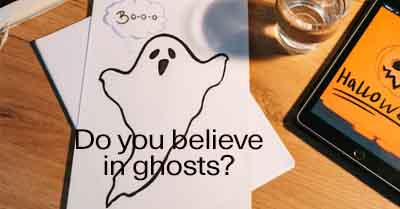Lesson 1. Verbs and Prepositions (Basic, A Level):
believe, feel, give, keep, know, leave, look, say
Back to the list
/bəˈliːv/ • believe, believe in
To believe someone or something means you trust or think someone or something is true or correct.
When you think something is real or exists you believe in it. You believe in people when you trust they can do something. You believe in people when you think they can be successful.
Examples: believe
- John says he is rich. I believe him because he has a large house and two expensive cars.
- Pedro says he can run a mile in 6 minutes. I don’t believe him.
- I believe that it’s time to leave.
Examples: believe in
- Do you believe in ghosts?
- They believe in the power of cooperation.
- I believe in being kind to others.
- Try again. I believe in you!

Ivan Samkov | Pexels
/ˈfiːl/ • feel, feel for, feel about
As an action verb, “feel” means you use your sense of touch. For example, you touch a sweater to feel how soft it is or to know how soft it feels.
As a linking verb, “feel” works just like the verb “be” (for example, “I am tired,” or “I feel tired). You are saying you know you are tired because of your senses.
When you feel for someone, you feel sorry for them.
You can also say you feel different things about something to express your feelings or emotions toward it. You can feel good, bad, unsure, terrible about something.
Examples: feel
- Feel the baby’s forehead. If it’s hot, she may have a fever .
- The baby feels hot. She may have a temperature.
- Feel this sweater. It feels very soft.

Tima Miroshnichenko | Pexels
Examples: feel for
- John studies very hard, but his grades are terrible. I feel bad for him.
- Anna is crying because she can’t find her cat. I feel for her.
- Patricia is doing very well in school. I feel happy for her.
Examples: feel about
- The new supervisor is great. How do you feel about him?
- Marisa feels unsure about her decision.
- How do you feel about the exam next week? Are you well prepared?
/ˈgɪv/ • give to
You give someone something.
You can also say you give something to someone.
Examples: give
- I want to give my mother a card on Mother’s Day.
- Give the children some money so they can buy ice cream.
- Are you going to give your girlfriend these flowers?

Vija R. Pratama | Pexels
Examples: give to
- Are you going to give these flowers to your girlfriend?
- Give some money to the children so they can buy ice cream.
- I want to give a card to my mother on Mother’s Day.

George Dolgikh | Pexels
/ˈkiːp/ • keep, keep from, keep to
When you continue doing something, you keep doing it.
You can also keep something when you continue having it.
If you stop people so that they do not do something anymore, you keep them from doing it. A situation can also keep you from doing something. The situation stops you.
To keep to something means you do something by following a rule, standard, schedule, or way.
Examples: keep
- What are you doing with your old shoes? Are you going to keep them?
- Don’t stop. Keep going.
- I need a new doctor. My doctor sometimes keeps me waiting for hours.
Examples: keep from doing
- The neighbors’ party is keeping George from falling asleep.
- The rain will keep people from going to the game.
- Nothing will keep me from going to your birthday party this weekend!

cottonbro studio | Pexels
Examples: keep to
- Drive carefully. Keep to the speed limit.
- Some vegans keep to a very strict diet of plants.
- Students must keep to their schedule during the semester.
- Sleep is important. You should keep to your bedtime every day.

Brett Sayles | Pexels
/ˈnoʊ/ • know, know about
You know someone after meeting them. You are familiar with the person.
You also say you know people or things that you understand very well.
When you say you know about people or things, it means you understand or have information about them. You have the information in your mind.
Examples: know
- I know someone who speaks 8 languages.
- It is important to know geography. It helps you understand the world better.
- Do you know how to drive?
- — Do you know Mr. Ecks?
— Mr. Ecks?… Who is that?
Examples: know about
- This book has everything you need to know about animals.
- I don’t know very much about this country.
- What do you know about the new boss?
/ˈliːv/ • leave, leave for
When you leave, you leave one place for another place. The preposition “for” gives you the destination.
Examples: leave
- What time do you leave work every day?
- Many Americans never leave the United States their whole lives.
- Emilio is leaving his job next week.
Examples: leave for (someplace)
- It’s almost 5. I need to leave for class.
- What time are you leaving for the party this evening?
- I need to leave for the airport at 7 tomorrow.
Using both in the same sentence
In this sentence, “we leave the hotel for the airport at 7 tomorrow," you have
- the starting point (home) without a preposition and
- the destination (the airport) with the preposition “for.”
For example,
- Emilio is leaving his job for a better one at the end of the month.
- When are you leaving the United States for France?
/ˈlʊk/ • look at, look for, look like
To look at people or things means you direct your eyes to them.
To look for people or things means you are trying to find them.
When two people look very similar, you say one person looks like the other.
Examples: look at
- In some countries, you must look at people in the eyes when you talk to them.
- — What are you looking at?
— I’m looking at some old pictures on my Instagram.
Examples: look for
- My rent is too high. I’m looking for a new apartment.
- I can’t find my glasses. Can you help me look for them?
- If you see John, tell him I’m looking for him.
Examples: look like
- Do you look like your father or your mother?
- — Look at that cloud! It looks like an animal.
— You’re right! It looks like a cat

Matheus Potsclam Barro | Pexels
/ˈseɪ/ • say to, say about
You can say something.
You can say something to someone.
You can also say something to someone about a topic or subject.
Examples: say / say to
- John says “hello.”
- John says “hello” to everybody.
- — What are you going to say to John?
— I don’t want to say anything to him. He may get angry.
Examples: say about
- What are you going to say to John about the party?
- Don’t say anything to him about the party. I don’t want him to come.
- Listen! The teacher is saying something about tomorrow’s test.
Assess Your Learning
Practice 1. Fill in the blanks using the correct prepositions after the verbs in this lesson.
Practice 2. Complete sentences using the verbs and prepositions in this lesson.
Congratulations on completing this lesson!

Thanks to our supporters!
This material has been made possible by supporters like you. Learn how you can support us.
Thank you for Supporting Snap Language
Snap Language supporters make the creation of these materials possible.
Learn how you can support our work, get perks, and help us continue creating high-quality materials.
You can support us by simply white-listing this site.
Thank you for Supporting Snap Language
Snap Language supporters make the creation of these materials possible.
Learn how you can support our work, get perks, and help us continue creating high-quality materials.
You can support us by simply white-listing this site.